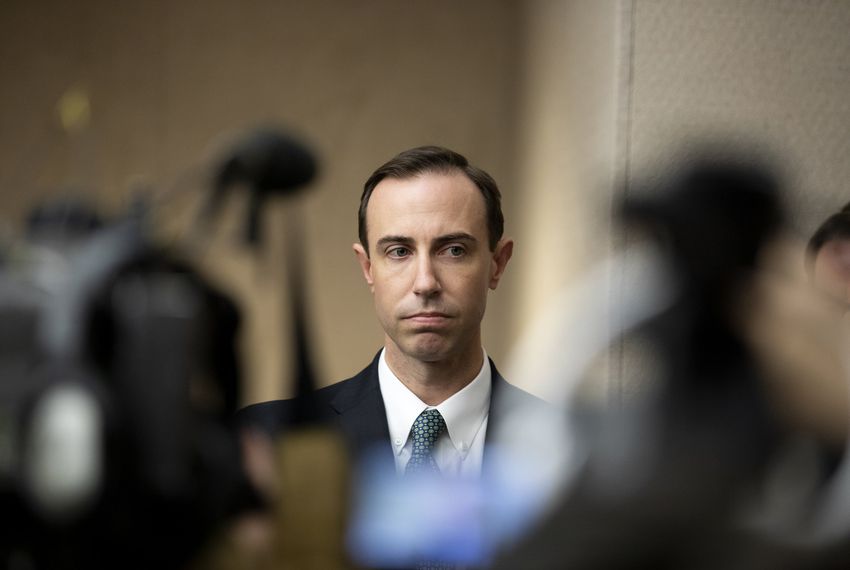Almost two weeks after calling into question the citizenship status of almost 100,000 registered voters, Texas’ new chief elections officer, David Whitley, defended his office’s decision to hand over those voters’ names to law enforcement even though he knew the list could contain mistakes.
At a Senate hearing to consider his confirmation as secretary of state, Whitley vacillated between telling lawmakers he referred the list of voters to the attorney general’s office because his office had no power to investigate them for illegal voting and describing the citizenship review efforts as an ongoing process based on a list that still needed to be reviewed by local officials. But he made clear is that his office knew from the start that the data could be faulty.
He stated that in response to a question from state Sen. Lois Kolkhorst, a Brenham Republican, who asked whether the secretary of state’s office had “cautioned the counties that there may be mistakes on the data.”
“Yes,” Whitley responded.
But when Democrats pressed him over his decision to send the list to the statewide office that handles criminal voter fraud prosecutions before the list was fully vetted, Whitley responded he wanted to get the data “in the hands of someone who could do something with it,” given that the secretary of state’s office had no power to investigate. That prompted follow-up questions about whether he should have waited until the list was scrubbed by local election officials, and Whitley doubled down with his defense despite describing the data as “preliminary.”
“I can tell you, senator, that 100 percent my reason for transmitting this data to the attorney general’s office was to ensure that these lists were as accurate as possible,” Whitley said to state Sen. Kirk Watson, D-Austin.
Sitting before senators in a packed committee room, Whitley faced blistering questions from Democrats for the better part of two hours. After brief opening remarks in which he touted his long career as a public servant, he somberly defended the controversial citizenship review efforts he ordered. But at times he struggled to answer technical questions about the flawed data at the heart of it.
At one point, Watson asked Whitley whether he’d consider asking the attorney general to hold off on investigating voters until the list was cleaned up. Whitley responded it was a “reasonable request” but said he was unsure “that it’s appropriate coming from my office.”
“You were the one who made the referral and blasted it all over the state,” Watson said.
Whitley has faced intense scrutiny of his decision to send Texas counties lists of registered voters who told the Department of Public Safety they were not citizens when they obtained a driver’s license or an ID card. Several Republican state leaders, including Attorney General Ken Paxton, quickly proclaimed that the number of names on the list indicated widespread voter fraud.
But Whitley’s review of the data did not account for people who became naturalized citizens — and then legitimately registered to vote — after receiving those documents. Driver’s licenses don’t have to be renewed for several years, and naturalized citizens are not required to update DPS on their citizenship status.
The citizenship review effort buckled within days after Whitley’s office quietly told local elections officials it had mistakenly flagged U.S. citizens who had registered to vote at DPS offices. Local elections officials have also identified other naturalized citizens on their lists who had registered to vote elsewhere. Since then, several voters who were naturalized after obtaining their driver’s licenses have also confirmed they are on the state’s list.
Despite acknowledging his office knew the list could contain mistakes, Whitley repeatedly brushed off Democrats’ questions about the list erroneously including tens of thousands of U.S. citizens.
“I read that in the paper,” Whitley said, before noting that DPS had shared with his office “the best data that they had on who in their database was not a citizen.”
Whitley is already a named defendant in three lawsuits Texas now faces over its citizenship review efforts. Naturalized citizens, civil rights groups and voting rights advocates have asked federal courts in San Antonio, Corpus Christi and Galveston to block the state from flagging voters for citizenship review, which they allege is unconstitutional and violates federal safeguards for voters of color because it imposes additional burdens to register to vote on naturalized citizens.
Republican Gov. Greg Abbott appointed Whitley to the position Dec. 17, but the Senate didn’t immediately confirm him because the Legislature was not yet in session. If his nomination makes it out of the Republican-dominated nominations committee, he’ll need a two-thirds majority among the lawmakers present when the full Senate votes. Republicans are in the majority in the 31-seat chamber, but Whitley will require at least some Democratic support unless several senators are gone the day of his vote.
The committee won’t vote on sending Whitley’s nomination to the full Senate until next week, but his path to confirmation remains rocky. Three Democrats serve on the nominations committee, and three others dropped in to question or raise concerns about Whitley’s botched citizenship review efforts. All seemed hostile — if not explicitly opposed — to the nomination.
In one awkward exchange, state Sen. Royce West, a Dallas Democrat, asked Whitley to define voter suppression.
“I think it’s irrelevant,” Whitley responded.
“You’re the secretary of state, sir,” West shot back. “It is relevant to me if I’m going to vote for your confirmation.”
Even some of the Republicans on the committee seemed to question Whitley’s rollout of the citizenship review efforts.
“I think maybe there were some regrettable statements on your press release,” Kolkhorst said, referring to the Jan. 25 announcement that Whitley’s office had flagged the voters for review and given their names to the attorney general because the secretary of state couldn’t “investigate or prosecute alleged illegal activity in connection with an election.”
“I would say maybe some of that should be tempered,” she said.
State Sen. Kel Seliger, R-Amarillo, asked Whitley about the DPS data his office used to draw up the flawed list of voters. But the secretary of state was largely unable to address Seliger’s questions about the process.
“Can my name get on that list?” Seliger asked.
“I don’t know, senator,” Whitley responded.
















